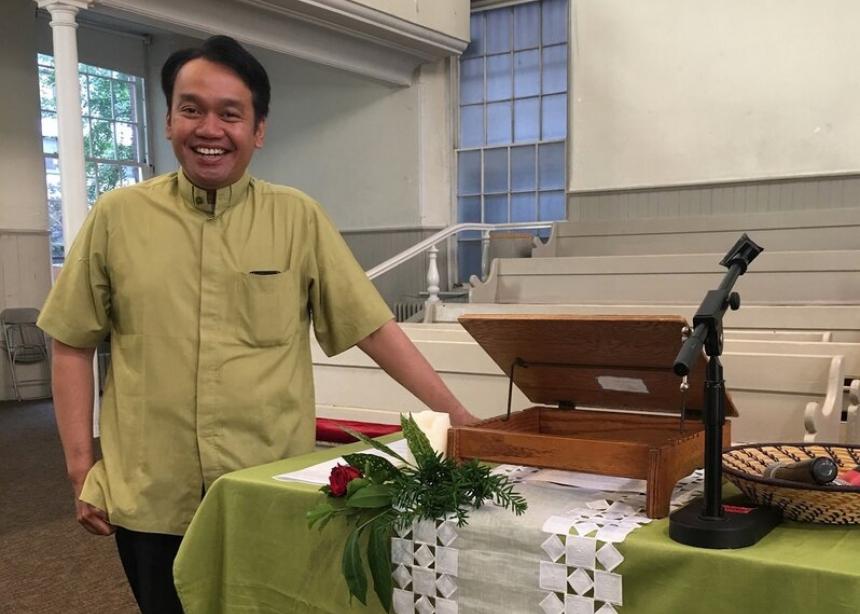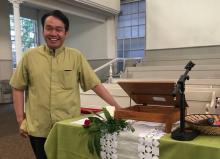Nindyo Sasongko believes theology should be publicly available to a wider audience. His experiment in online discussions began in late 2018. When the pandemic hit last year, “@Theovlogy” increased in frequency to meet the demand for online means of connecting.
“The initial purpose was to be for laypeople who don’t have background in theology in Indonesia,” he says. “We started with 15- to 20-minute episodes on theology matters accessible to a general audience. Later on, we [found] out that our audience grew—not only from Indonesia but also my colleagues.”
A doctoral student and a teaching fellow in theology at Fordham University, New York, N.Y., Sasongko initially invited fellow theology students from Indonesia to join him in humble conversations online. Soon, students from around the world started joining the conversation.
Three of the six founders are Mennonites: Sasangko and a second theology student, Adi Widya Nugroho, were raised in the Gereja Kristen Muria Indonesia (GKMI) conference in Indonesia. Perdian Tumanan is studying at Associated Mennonite Biblical Seminary in Elkhart, Ind. Their meeting grew into “@Theovlogy,” an online theology discussion channel with almost 250,000 followers.
Concerned about accessibility for those with poor internet connections, Nindyo Sasongko converts the recordings to audio for podcasts. But he sees the barriers of access melting away. During the pandemic, sometimes those in rural Indonesia have a better connection than he does in New York.
“@Theovlogy” was launched into English—and to a wider audience—in 2019 at the Global Anabaptist Peacebuilding Festival in the Netherlands put on by Mennonite World Conference (MWC), when they spoke with Mennonite historian Ben Goossen.
The audience comes from a variety of different traditions; “probably more progressive Christians, but also conservative,” says Sasongko. Guests have included well known experts in their fields, but it started with inviting friends. “We wanted to provide a non-elite form,” he says. “We invited BA students with passion in theology, people writing a paper that got published.”
A new appetite for theological conversation
The pandemic was “a blessing in disguise” for “@Theovlogy”, says Sasongko. The organizers were busy with schoolwork; six months passed without a new episode. Then the lockdown happened in mid-March, and everyone had time at home.
“I thought I would be insane if I just prepared for class,” he says. So, “Theovlogy” revived. Soon Sasongko learned about other podcasts in Indonesia following its example.
Teaching classes online left him feeling stretched. “Before the pandemic, [to discuss theological matters] we would meet our audience and they would pose questions directly to us. Now we could only see their writing, short questions; we could not see their expressions.” But over at “@Theovlogy,” “our conversations brought me health,” he says.
“We found people can follow and interact as they watch our conversations,” he says. “Before, regular church people’s retention is 20 to 25 minutes. During the pandemic, people sit and watch for about an hour, on hard theological topics. They stay with what we are discussing. They can re-watch or re-listen. I didn’t see this happen before the pandemic.”
“This is a safe space,” he says. Hosts and guests talk about faith and religion “without being judged by doctrine, dogma or rules.
“Our audience can have access to theological matters that they did not expect before. Many of our audience expected theology as a defence of faith, apologetics.” But the podcast showcases different views of theology. The audience experiences how theology can be approached not from an apologetical point of view, but from a more collegial, conversational and hospitable point of view.”
“@Theovlogy” has hosted a Muslim scholar and an agnostic as guests. “We never knew Christianity in this kind of openness and hospitality,” he says both guests and listeners have told them.
“In this sense, I can see this is a Mennonite way of providing reconciliation,” he says.
Lessons for the new normal?
“When we can, we sit together and let’s talk,” Sasongko says.
But, in the meantime, he has seen the potential for even a remote, screen-mediated experience to provide a connection, the sense of community that Anabaptists believe is imperative to church.
“The church breaks down barriers,” he says.
Online services have done that in a new way, making it possible for people around the world to participate in church together. “This might be what the Apostle Paul says: ‘In Christ all boundaries are broken down, there is no Jew nor Greek’ [Galatians 3:28],” he says.
“I see that this might be the future of the church,” he says, adding, “There is an openness that isn’t there in person in four walls.”
“When all humans are connected through the internet today, I ask myself what it means to be human,” he says. “It is to be open to vulnerability, because only in this way, we learn to see new possibilities.”



Add new comment
Canadian Mennonite invites comments and encourages constructive discussion about our content. Actual full names (first and last) are required. Comments are moderated and may be edited. They will not appear online until approved and will be posted during business hours. Some comments may be reproduced in print.